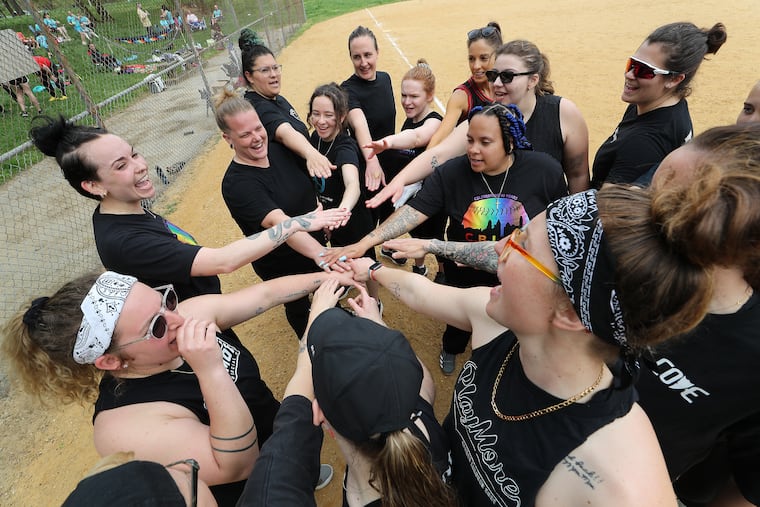‘No one will ever take this away from me’: The City of Brotherly Love Softball League is celebrating its 40th year of queer sports
Forty years after the league was founded for gay men in the ‘80s, the league has broadened its reach — and its need is just as pertinent.

Sue Gildea teared up as she took in the sights around her Sunday.
There were families picnicking on the lush green grass of Fairmount Park, small children playing with their toy trucks in a mound of sand, dogs wagging their tails as they greeted each other.
The energy at the park’s Dairy Fields was palpable, the joy infectious. It was the opening games of the City of Brotherly Love Softball League’s 40th season, and league members and their families were there to celebrate and reflect on what four decades of an intentional space for the queer community has brought.
Gildea, former commissioner of the league, remembers the first opening day she attended after joining the league in 1996 — four years after she came out.
“To see people like me, and to feel that connection and go, ‘Wow, I’m not the only one — there are others like me,’” she said. “It’s about belonging. It’s about me being me, and then also to help others become who they are. No one will ever take that away from me.”
Now she looks around and sees her family. Weddings that league members invited each other to, children who they raised together in community (the number of league offspring outnumbers athletes this year).
That space of belonging and connection was particularly important when the league was first formed for gay men in 1983, when homophobia was rampant. A group of gay baseball players who had worked together in the Gay Activists Alliance came together to create a space free of intimidation and stereotyping, and one that is safe for participants to be their authentic selves.
“We were conscious that there were gay men and lesbians that were athletic, and probably played straight sports, but weren’t comfortable,” said Jeff Eiberson, a founding member of the softball league. “And then we had a lot of potential players who, there’s no reason they couldn’t develop the skills, but they were too intimidated — especially back then, everybody wouldn’t come out in high school.”
The need quickly became apparent: That first year, Eiberson had 36 people on his team alone.
Ten years later, the Women’s Plus Division was formed for women, nonbinary, trans, and gender-nonconforming folks.
Lisa Schweizer was recruited to join the very first women’s team when she walked into a bar called Hepburn’s. A woman went up to Schweizer, said she looked like a softball player, and asked if she wanted to play in a gay league. Schweizer said yes.
“I never looked back,” Schweizer said. “The camaraderie of the league and the inclusivity of it, and everybody being so warm and friendly. It’s all about fun, everybody’s supportive, letting people know that they can come to play ball in a safe space without being judged or criticized in any way.”
“It’s about me being me, and then also to help others become who they are.”
Thirty years later, Schweizer is now a coach and sponsor of her own team, 369 Sharks. And the need is just as important today as it was 40 years ago.
Jen Brown, current commissioner of the league, walked out onto the pitch mound Sunday wearing a black muscle tank with rainbow letters that read, “It’s a good day to read banned books.”
“I don’t think I need to give anyone in this group a history lesson about why this league was important to have in the ‘80s,” she said. “Right now, trans and gender-nonconforming folks are 100% under attack in the country. We know that there is harmful legislation being passed. And when one of us is under attack, all of us are under attack.”
But Brown emphasized that the point of the league is not to be political, but rather follow through with the commitment to support everyone in the league on and off the field — and have fun.
With fun being one of the main objectives, this year’s 32 teams got creative with their names: There’s the Flaming Poodles, Sunday Hangover, Pitches be Crazy, Rainbow Riderz. And experience levels vary — some have never picked up a softball before, others have come home winners in the Gay Softball World Series. But no matter the team or experience level, everybody is out there to enjoy themselves.
“When one of us is under attack, all of us are under attack.”
For Noelle Zimmerman, switching to the City of Brotherly Love Softball League from a prior softball league she played in was a breath of fresh air. On her old league, people would throw tantrums if they got tagged out, and yelling and aggression were common — a particularly alarming space for her to be in as a queer woman. At her new league, people actually have fun with the game and are able to express themselves to the fullest.
That particularly materialized for Jonathan Maldonado, who first joined the league in 2019 as a straight ally. Maldonado had been playing softball for years, often in leagues that felt much more toxic, he said. But being in such a supportive environment allowed Maldonado to express his authentic self, and he came out one year later.
“Talking to a few of my friends that are already here, they were like, ‘You don’t want to stay hidden forever,’” Maldonado said between innings, his children running around him. “It was a matter of feeling included.”